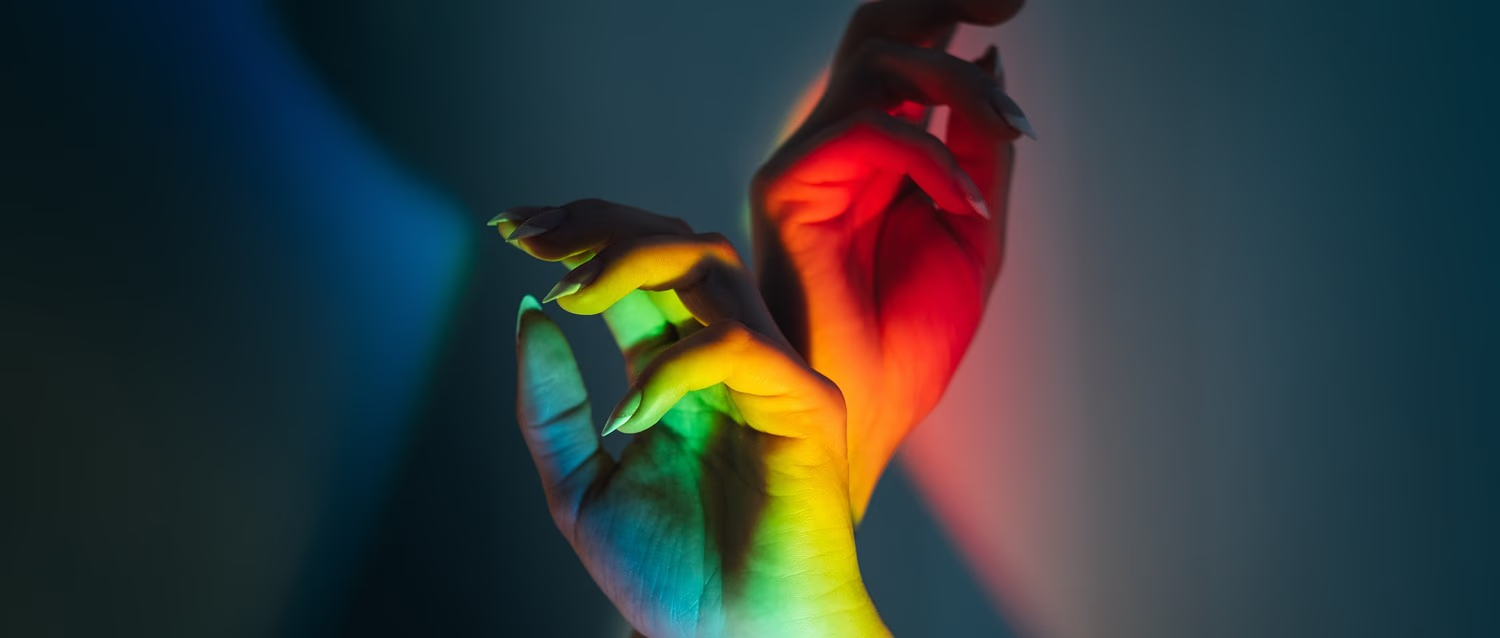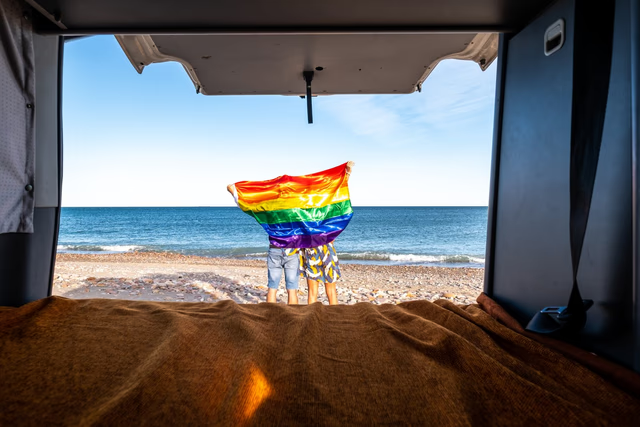
LGBTQ+ people share their personal conversion therapy stories
Peer reviewed by Dr Sarah Jarvis MBE, FRCGPLast updated by Emily Jane BashforthLast updated 8 Feb 2022
It's still legal for LGBTQ+ people in the UK to be subjected to conversion therapy, a harmful practice, which aims to suppress or 'cure' people's sexual orientation and/or gender identity. While many of us may be aware of the existence of conversion therapy, much of it happens underground. Therefore, we might not fully understand how it truly affects LGBTQ+ people in the long term.
In this article:
Stonewall says that 7% of LGBTQ+ people have been offered or undergone conversion therapy. In this feature, we will meet three LGBTQ+ people who have experienced this, as they share their conversion therapy stories and challenges in rebuilding their lives.
Continue reading below
Sienna's story
She/her
Sienna,* 31, is non-binary (neither male nor female) and was sent to conversion therapy by her father every summer between the ages of 12 and 15.
Sienna has known she is a lesbian since the age of 8, but her devout Catholic father planned for her to "pray the gay away" at camps.
She recalls the worst part of the experience as being when the practitioner or administrator were abusive towards her when she was 14.
"They would often try to beat the 'queer thoughts' out of us. During my father's last attempt at conversion therapy, I knew that these camps would never end if I didn't pretend to be straight. So, I put on a facade of being 'normal' for him. It's only then that the abuse ended."
Reaching out for help
Sienna didn't tell anyone about what she'd been through, until her late 20s. Instead, she turned to alcohol, drugs and sex as coping mechanisms.
"I didn't care about what I was using to cope because it felt like no one cared about what happened to me. Eventually, I did talk about it with close friends and then my mother, years after she got divorced from my father. It was so difficult to open up about," she says.
The lasting impact
"It had both positive and negative effects on me," says Sienna.
"The abuse my body and mind went through means it's now harder for things to get to me. Negatively, though, it made it harder for me to open up to people. I want countries that are yet to ban conversion therapy to know how damaging it is. It's a barbaric practice that does more harm than anything else. I've known people who killed themselves because they weren't allowed to be their true selves. Conversion therapy doesn't work and should never be thought of."
Fortunately, Sienna now has support from her wife as she continues to build her relationship with her identity.
"I’ve always known that I was different. I've struggled with my identity for years, but deep down I know who I am. I am male and I’m in the process of accepting that and coming out with it. I've talked with my wife about it and she supports me whether I remain her wife or change into her husband. Only the future will tell."
Jamie’s story
They/them
Jamie* is 51 years old and they are a trans genderqueer, panromantic asexual (neither male nor female and with the capacity to experience romantic attraction to people of all genders, but seldom, if ever, sexual attraction).
They were subjected from a young age to conversion therapy via a religious cult and forced to attend 'meetings' three times a week.
"In all of their talks and literature, I was taught that being homosexual, or transgender, is an 'abomination', and that if you are either of these things you are disgusting and worthy of death."
These 'teachings' were all Jamie knew from birth, meaning they felt very confused as they started to question their gender identity.
"I genuinely thought I was evil as a child when I realised that I didn't feel like a girl and I mostly had crushes on girls," they say.
Opening up
Jamie never talked about what they went through with anyone, but instead suppressed it as much as possible.
"When I was in my early 20s, I ran away from my hometown. I was still trying to live as someone I wasn't and portraying myself as a 'straight woman'. However, I thought things would be better outside of a religion that told me I was going to die for simply being myself."
They describe the main problem at this stage was the lack of information available. With no resources or support, Jamie wasn’t able to address how they felt or to be who they are.
Instead, they tried to 'fit in' with what they thought was expected, and got married and had children.
"It took me another 16 years before I came out to my friends as bisexual. Then the more information I was able to access on the internet, the more I had language to describe who I actually am," they share.
The impact on their mental health
Jamie describes the impact of conversion therapy on their mental health as "horrendous".
"I tried to take my own life several times. I've had more than one breakdown. I was eventually diagnosed with bipolar, complex-PTSD, and bulimia."
Jamie was also a victim of domestic violence when their husband became abusive. They only felt able to leave him after their children helped them realise what was happening.
"It was at that point when I was free of the need to pretend any more, that I was able to come out as trans genderqueer. My kids, who are now grown up, are super supportive in every possible way."
Looking to the future
"It makes me so sad that I spent most of my life afraid, full of self-loathing, and so desperately unhappy trying to be someone I'm not. Now, although I still battle with my mental illnesses, I am at least able to feel a calm sense of acceptance because I'm living my life as myself," says Jamie.
However, they add how devastating it is to now be in their 50s and never to have been in a happy, romantic relationship.
Looking towards the future, they hope things can get better. In some ways, they already are. However, they're also aware of how prevalent transphobia is and passionately believe we need to outlaw conversion therapy completely.
"I see the future filled with positivity concerning my personal life. For one thing, I have my first appointment at a gender identity clinic very soon. However, from a broader perspective, I'm afraid of the anti-LGBTQ+ rhetoric (more specifically anti-trans rhetoric) that seems to have poisoned our society.
"LGBTQ+ people just want to be left alone to live their lives and to be treated as equals. This is still extremely hard to do, and will be for as long as conversion therapy exists."
Jamie explains how equality is beneficial for everyone, and discriminating against people for their sexuality or gender damages the fabric of society.
"Forcing someone to be something they are not is torture. Wider society is missing out on wonderful, talented human beings because so many are damaged and their self-esteem has been destroyed."
Patient picks for Identity
Continue reading below
Ben's story
They/them
Ben, 34, is a gay man who also endured conversion therapy in a religious setting, which they describe as "brainwashing".
They say their religion seemed very friendly on the surface. However, there were rules and it was frowned upon to mix outside the religion. Doing so could result in being publicly reprimanded or, more dangerously, 'disfellowshipped'. This meant being shunned by all in the religion, blacklisted, and losing all support from friends and family.
Their religious parents forced them into studying the Bible daily, attending regular meetings and completing 'study' activities. Ben also had to go door-to-door or preach on the streets every week.
"From a very young age, I knew was gay. However, I had been taught that homosexuality was disgusting in the eyes of God. I felt so alone with the feelings I had."
Coming out
Ben was 'outed' by another member of their faith group who found out that they had a boyfriend. Ben was 21.
"He gave me the ultimatum that I had to tell my parents before he did. We were dealing with a family bereavement, so it wasn’t the right time. I was petrified of the repercussions of coming out, so I initially did it by text message. I hoped it would soften the reaction when I was face-to-face with my parents.
"However, I was accused of deceiving my parents, and their reaction was hateful. They told me I was "disgusting" as they feared what other people would say. Our family environment became a warzone."
Ben’s parents tried to tell them they were going through a "phase" and just "hadn't met the right girl yet". This went on for months, destroying their mental health and leaving them with no choice but to endure religious study activities.
"They wanted to 'make me see sense'. Over a year I had to talk about my sexuality in detail, as I risked being made homeless. I was even made to change my dress sense to stop wearing bright colours and have my hair cut short to appear more 'masculine'.
Ben had to read the same scriptures over and over, even being given 'homework' of watching female pornography, which they did in an attempt to regain stability over their life.
Eventually, Ben hit rock bottom and repeatedly ran away from home.
The devastating impact
After feeling isolated for so long, Ben struggled to open up to others. They lost faith and had no real contacts beyond their family or religion. Not having a support system meant they felt 'clueless' regarding life in the real world.
"I have struggled with my sexuality all my life and what I’ve been through means I now battle constantly with shame, fear, trust issues, needing validation and waiting for people to abandon me," they share.
Ben also has very low self-esteem and self-worth. However, they are starting to own their trauma.
"I now want to talk about my experiences, hopefully to reach people who might be in similar situations. I would have loved for someone to reassure me all those years ago, and to remind me that it gets better."
Now what?
"Every year countless LGBTQ+ lives are lost as people are unable to cope with the abuse. Those of us who do manage to survive are left with mental scars that are just as deep as any physical damage," says Ben.
They want more support for victims of conversion therapy, and for people to be reminded they aren't alone.
"Everyone deserves a safe space. If I had that, it could have been my chance to escape earlier, and I want that option for anyone in my situation."
If you have been a victim of conversion therapy and you would like support, you can reach out to Stonewall. You can contact them on FREEPHONE 0800 0502020, with lines open 9:30 am-4:30 pm Monday-Friday (answerphone available outside these hours). You can email them at info@stonewall.org.uk or write to them at: Stonewall, 192 St John Street, London, EC1V 4JY.
*names changed
Article History
The information on this page is written and peer reviewed by qualified clinicians.
8 Feb 2022 | Latest version

Feeling unwell?
Assess your symptoms online for free
